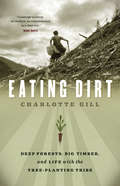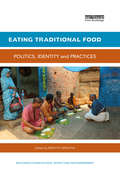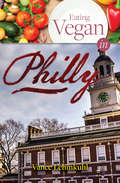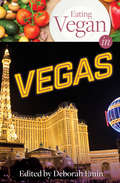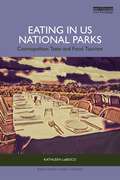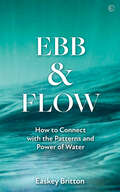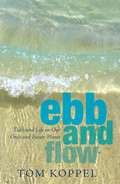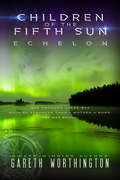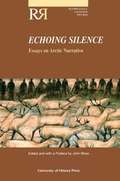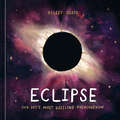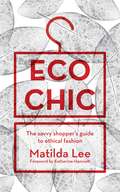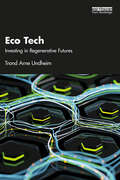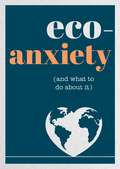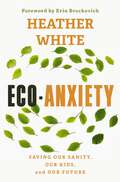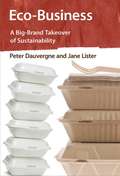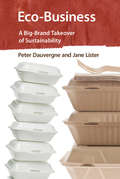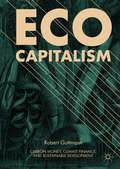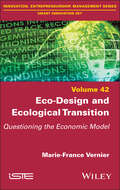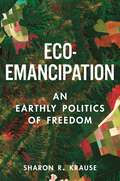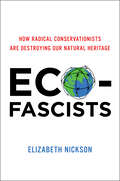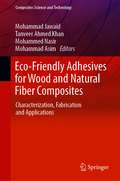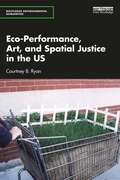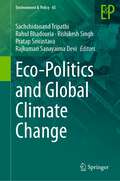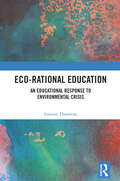- Table View
- List View
Eating Dirt
by Charlotte Gill* Winner of the BC National Award for Non-Fiction* Nominated for the Charles Taylor Prize for Literary Non-Fiction and the 2011 Hilary Weston Writer's Trust Award.During Charlotte Gill's 20 years working as a tree planter she encountered hundreds of clear-cuts, each one a collision site between human civilization and the natural world, a complicated landscape presenting geographic evidence of our appetites. Charged with sowing the new forest in these clear-cuts, tree planters are a tribe caught between the stumps and the virgin timber, between environmentalists and loggers.In Eating Dirt, Gill offers up a slice of tree-planting life in all of its soggy, gritty exuberance while questioning the ability of conifer plantations to replace original forests, which evolved over millennia into intricate, complex ecosystems. Among other topics, she also touches on the boom-and-bust history of logging and the versatility of wood, from which we have devised countless creations as diverse as textiles and airplane parts. She also eloquently evokes the wonder of trees, our slowest-growing "renewable" resource and joyously celebrates the priceless value of forests and the ancient, ever-changing relationship between humans and trees.
Eating Traditional Food: Politics, identity and practices (Routledge Studies in Food, Society and the Environment)
by Brigitte SebastiaDue to its centrality in human activities, food is a meaningful object that necessarily participates in any cultural, social and ideological construction and its qualification as 'traditional' is a politically laden value. This book demonstrates that traditionality as attributed to foods goes beyond the notions of heritage and authenticity under which it is commonly formulated. Through a series of case studies from a global range of cultural and geographical areas, the book explores a variety of contexts to reveal the complexity behind the attribution of the term 'traditional' to food. In particular, the volume demonstrates that the definitions put forward by programmes such as TRUEFOOD and EuroFIR (and subsequently adopted by organisations including FAO), which have analysed the perception of traditional foods by individuals, do not adequately reflect this complexity. The concept of tradition being deeply ingrained culturally, socially, politically and ideologically, traditional foods resist any single definition. Chapters analyse the processes of valorisation, instrumentalisation and reinvention at stake in the construction and representation of a food as traditional. Overall the book offers fresh perspectives on topics including definition and regulation, nationalism and identity, and health and nutrition, and will be of interest to students and researchers of many disciplines including anthropology, sociology, politics and cultural studies.
Eating Vegan in Philly
by Vance LehmkuhlEating Vegan in Philly is the latest volume in the Vegan City Guides series, published by Sullivan Street Press. The author, Vance Lehmkuhl, is the vegan columnist for the Philadelphia Daily News, V for Veg, and also writes the philly.com blog, V for Vegan. With this expertise, he covers the historical roots of the vegetarian/vegan scenes in Philadelphia and the rise over the last 50 years of a vital and important restaurant and food scene devoted to plant-based living. This book offers travelers a guidebook to all the vegan and vegan friendly restaurants in the area along with some of the most interesting sites and sights in Philadelphia to experience.
Eating Vegan in Vegas
by Deborah Emin Mary Beth Horiai William Bendik Marsala Rypka Evan AllenVegan City Guides is an ongoing set of travel guides meant for the vegan business and leisure traveler. Each city's guide will make available not only the food choices available in each place but will also introduce the vegan to the varieties of sites, interests, and activities that appeal to those involved in a plant-based life. Each guidebook is designed to ask the question, what would a vegan like to do in this city? Besides finding the best places to eat.
Eating in US National Parks: Cosmopolitan Taste and Food Tourism (Routledge Food Studies)
by Kathleen LeBescoThis book presents a fascinating exploration of eating experiences within US national parks, explaining how, on what, and why people eat in national parks and how this has changed over the last century. National parks are enjoying unprecedented popularity, and they are especially popular sites for the expression of cosmopolitanism, an ideological outlook descended from the Romantics on whose vision the parks were originally founded. The book explores the constructed foodscape within US national parks, situating the romantic consumption ethos within the context of sociological work on distinction, culinary tourism, and culinary capital. It analyzes and problematizes elements of cosmopolitan taste and desire, examining food tourism in wilderness spaces that satisfies cosmopolitan hunger for authenticity and a certain type of self-making. Weaving together strands of research that have not been previously integrated, the book gleans meaning from concessions menus and park restaurant web pages and employs audience analysis to take stock of park restaurant visitors’ contributions to restaurant review websites, as well as to understand how they represent their park eating experiences on social media. The book examines how satisfying cosmopolitan tastes in the parks creates profit for corporate concessioners, but also may produce bioregionalist successes and a recentering of Indigenous foodways. It concludes by exploring inroads to a better food experience in the parks, involving food products and processes that are regionally/locally specific, where tourists witness and participate in food production and enjoy commensality, but that are also non-extractive and show care for the environment and the people who inhabit it. This book will be of great interest to students and scholars of food studies, tourism and hospitality, sociology of culture, parks and recreation, American studies, and environmental studies. The book will also be of interest to parks and recreation decision makers, sustainable tourism leaders, and hospitality managers.
Eating the Alphabet Fruits and Vegetables from A to Z
by Lois EhlertAn alphabetical tour of the world of fruits and vegetables, from apricot and artichoke to yam and zucchini, including descriptions of 75 fruits and vegetables.
Ebb and Flow: How to Connect with the Patterns and Power of Water
by Easkey BrittonAn exploration of water's power to heal us, inspire us and offer us spiritual meaning. This is a feminist reimagining of the meaning of power through the lens of water. Easkey offers a range of wellness practices to encourage the reader to connect with water as healer, restoring a relationship of care.Our strength lies in being soft like water. This book is about the power we gain by connecting to water. It&’s about how we can restore our relationship with the world's different bodies of water, and by doing so, restore both the water and ourselves. By sharing Easkey's own experiences as surfer and marine scientist, as well as those of many of her mentors who are at the forefront of water protection and activism around the world, it guides readers into reimagining the spirituality of water and restoring our innate connection with this lifeblood of the planet.The book also provides the reader with water-inspired strategies to restore calm, reduce stress and soothe anxiety. These range from simple breathing and visualization exercises to undertaking a journey from a water source to the ocean in order to forge a deep connection with the water. The emphasis is as much on the benefit to water as it is to the individual, and on creating a culture of reciprocity and care. By regaining this lost connection with water, we learn to develop an empathic connection with the force of all life and in the process restore our own hearts and minds.
Ebb and Flow: Tides and Life on Our Once and Future Planet
by Tom KoppelEbb and Flow was named one of 2007’s "best science books" by Peter Calamai, science editor of the Toronto Star [Dec. 30, 2007]. He calls it a "wonderful resource book. Tom Koppel seems to have visited or read about every place with unusual tides and water currents, yet he wears this scholarship lightly." Tides have shaped our world. They have carved out shorelines, transformed early life on Earth, and altered the course of human civilization. Tides frustrated Alexander the Great and Julius Caesar, and aided General MacArthur. They govern the way our planet moves, provide us with an alternative source of energy, and may be aggravating global climate change. Drawing on science, history, and personal memories, Koppel’s fascinating book engages and enlightens, demonstrating that a subject we take for granted affects all our lives. He weaves together three grand narratives, exploring how tides impact coasts and marine life, how they have altered human history and development, and how science has striven to understand the surprisingly complex way in which tides actually work.
Echelon (Children of the Fifth Sun)
by Gareth WorthingtonShe thought there was nothing stronger than a mother’s bond. She was wrong.FIFTEEN THOUSAND YEARS AGO, the knowledge bringers—an amphibious, non-humanoid species known as the Huahuqui—came after a great global flood, gifting humans with math, science, and civility.We killed them all.Seventy years ago, we found one of their corpses preserved in ice and eventually created a clone named K’in. Our governments fought over the creature and we killed it, too. Now, a sinkhole in Siberia has opened, revealing new secrets.FREYA NILSSON spent the last five years trying to forget her role in the Huahuqui cloning program. She hid her son, KJ, from the regimes and agencies she believed would exploit him for the powers he acquired through his father’s bond with K’in.An innocent trip to help KJ understand his abilities results in the conspiracy she fought to bury exploding back to life. Chased by new foes and hounded to put the world first, all Freya can think of is protecting KJ—at all costs.Children of the Fifth Sun: Echelon is the sequel to Gareth Worthington’s multi-award-winning debut novel Children of the Fifth Sun.
Echoing Silence: Essays on Arctic Narrative
by John MossThis book discusses the different generations of explorers and writers and illustrates how the sounds of a landscape are inseparable from the stories of its inhabitants.
Eclipse: Our Sky's Most Dazzling Phenomenon
by Kelsey OseidDiscover the ancient myths and fascinating science of the world&’s most striking celestial phenomena—eclipses—in this educational, beautifully illustrated guide by the acclaimed author of What We See in the Stars.Awe-inspiring, majestic, and always a little otherworldly, eclipses have captivated our imaginations for thousands of years. Whether plunged into darkness as the sun disappears in the middle of the day or enchanted by the moon&’s blood red glow as a vast shadow creeps across its surface, our ancestors both feared and revered eclipses, seeking to understand these striking celestial events through both storytelling and science.In Eclipse, celebrated artist and author Kelsey Oseid explores the science and mystique of lunar and solar eclipses, from the myths of our ancestors to today. Did you know that in Chinese legends, solar eclipses were caused by dragons eating the sun? Or that the Norse people believed that a sky wolf chased away the moon? Oseid presents these rich historical stories alongside informative, accessible science to enrich your understanding: a solar eclipse only occurs during a new moon; a selenelion is when you can see the lunar eclipse in front of you and the sunset behind you; and the Mars Rovers have even taken photographs of eclipses from Mars.Filled with captivating information and vivid, colorful illustrations, Eclipse will delight and inspire astronomy lovers of all ages.
Eco Chic: The savvy shopper's guide to ethical fashion
by Matilda LeeThe hottest trend on the catwalk is ethical clothing. Top fashion designers and spokesmodels including Katharine Hamnett, Stella McCartney and Bono's wife Ali Hewson are all voicing the benefits of eco chic. But what is this new fad, and what difference can it make to the world? "Eco Chic" gives you the full story on this fashion phenomenon, from which fabrics are harmful to the environment, to how you can create your own eco-friendly fashions through recycling and savvy shopping. You will discover how to spot and avoid garments produced in sweatshops and why supermarket 'fast clothes' make both you and the planet sick. This book will allow you to look great but also feel good about your impact on other people and the planet as a whole.
Eco Tech: Investing in Regenerative Futures
by Trond UndheimThe book is a seminal contribution from a leading futurist who, over the past three decades, has explored each of the most disruptive forces shaping our world today, including emerging technologies, entrepreneurship, venture investments, and industrial manufacturing. Eco Tech brings all this thinking together, fusing insight from thought leaders with the author’s own considerable experience, to explore scenarios for 2050 and discuss eco-effectiveness as an established practice for governments, corporations, startups, and individuals. Trond Arne Undheim begins by providing a brief history of sustainability and provides simple definitions for key terms including eco-efficiency, life cycle analysis, industrial ecology, cleantech, net zero, climate change, biodiversity, and carbon capture, which will enable the reader to engage confidently in eco-discussions. Undheim also explores the ambitions of regeneration and offers a new conceptual framework to facilitate future discussion around sustainable innovation. He applies this framework to green, ambitious start-ups and examines the way these ventures will lead the way towards an eco-effective society, drawing on stories from exciting founders who are already changing the world. Finally, the book takes a deep dive into emerging eco-innovations, including batteries, bioplastics, distributed energy, space tech, and futuristic megaprojects. The book contains clear directions on how to progress through adversity and avoid returning to the status quo. The book will be an essential guide for executives, sustainability professionals, and energy tech investors who are deeply concerned with the future and are prepared to both significantly invest in it and make behavioral changes to foster regenerative development. It will also be a great resource for students and scholars of sustainable investing and innovation.
Eco-Anxiety (and What to Do About It): Practical Tips to Allay Your Fears and Live a More Environmentally Friendly Life
by Harriet DyerBe kind to the planet, but most of all, be kind to yourselfWhen you feel the weight of the world on your shoulders, grab this book for a dose of calm and courage. Packed with reassuring tips and advice, from mindfulness exercises to practical steps you can take to make a difference, this guide will ease your eco-anxiety and help you to live a more environmentally friendly life.
Eco-Anxiety: Saving Our Sanity, Our Kids, and Our Future
by Heather WhiteThe climate crisis and its resulting eco-anxiety is the biggest challenge of our time. The anxiety that comes with worrying about how environmental harm will impact our--and our children's--lives can be overwhelming. Learn how to balance practicing daily sustainability actions while caring for your own eco-anxiety in this revolutionary book from noted environmentalist Heather White.In Eco-Anxiety, White shows you how to contribute to the climate movement through self-discovery and self-care. Utilizing the Service Superpower Profile Assessment included in the text, you&’ll discover how your personality, interests, and strengths can be of service to others and the planet. This book will serve as your guide to:Begin a 21-Day Kickstarter Plan that shares specific sustainable actions you can takeTrack your progress with journal prompts and exercises that'll help you measure mental health benefitsListen and talk with loved ones about their climate anxietyCommit to being an eco-aware individual and inspire your family, friends, and community to work toward a regenerative, sustainable worldSetting the intention each day to take a small step to care for the planet--can help ease your eco-anxiety, push the culture toward climate solutions, and create a sense of joy.One Green Thing>
Eco-Business
by Peter Dauvergne Jane ListerMcDonald's promises to use only beef, coffee, fish, chicken, and cooking oil obtained from sustainable sources. Coca-Cola promises to achieve water neutrality. Unilever has set a deadline of 2020 to reach 100 percent sustainable agricultural sourcing. Walmart has pledged to become carbon neutral. Today, big-brand companies seem to be making commitments that go beyond the usual "greenwashing" efforts undertaken largely for public relations purposes. In Eco-Business, Peter Dauvergne and Jane Lister examine this new corporate embrace of sustainability, its actual accomplishments, and the consequences for the environment. For many leading-brand companies, these corporate sustainability efforts go deep, reorienting central operations and extending through global supply chains. Yet, as Dauvergne and Lister point out, these companies are doing this not for the good of the planet but for their own profits and market share in a volatile, globalized economy. They are using sustainability as a business tool. Advocacy groups and governments are partnering with these companies, eager to reap the governance potential of eco-business efforts. But Dauvergne and Lister show that the acclaimed eco-efficiencies achieved by big-brand companies limit the potential for finding deeper solutions to pressing environmental problems and reinforce runaway consumption. Eco-business promotes the sustainability of big business, not the sustainability of life on Earth.
Eco-Business: A Big-Brand Takeover of Sustainability (The\mit Press Ser.)
by Peter Dauvergne Jane ListerTwo experts explain the consequences for the planet when corporations use sustainability as a business tool.McDonald's promises to use only beef, coffee, fish, chicken, and cooking oil obtained from sustainable sources. Coca-Cola promises to achieve water neutrality. Unilever seeks to achieve 100 percent sustainable agricultural sourcing by 2020. Walmart has pledged to become carbon neutral. Big-brand companies seem to be making commitments that go beyond the usual “greenwashing” efforts undertaken largely for public-relations purposes. In Eco-Business, Peter Dauvergne and Jane Lister examine this new corporate embrace of sustainability, its actual accomplishments, and the consequences for the environment. For many leading-brand companies, these corporate sustainability efforts go deep, reorienting central operations and extending through global supply chains. Yet, as Dauvergne and Lister point out, these companies are doing this not for the good of the planet but for their own profits and market share in a volatile, globalized economy. They are using sustainability as a business tool. Dauvergne and Lister show that the eco-efficiencies achieved by big-brand companies limit the potential for finding deeper solutions to pressing environmental problems and reinforce runaway consumption. Eco-business promotes the sustainability of big business, not the sustainability of life on Earth.
Eco-Capitalism: Carbon Money, Climate Finance, and Sustainable Development
by Robert GuttmannOur planet faces a systemic threat from climate change, which the world community of nations is ill-prepared to address, and this book argues that a new form of ecologically conscious capitalism is needed in order to tackle this serious and rising threat. While the Paris Climate Agreement of 2015 has finally implemented a global climate policy regime, its modest means belie its ambitious goals. Our institutional financial organizations are not equipped to deal with the problems that any credible commitment to a low-carbon economy will have to confront. We will have to go beyond cap-and-trade schemes and limited carbon taxes to cut greenhouse gas emissions substantially in due time. This book offers a way forward toward that goal, with a conceptual framework that brings environmental preservation back into our macro-economic growth and forecasting models. This framework obliges firms to consider other goals beyond shareholder value maximization, outlining the principal tenets of a climate-friendly finance and introducing a new type of money linked to climate mitigation and adaptation efforts.
Eco-Design and Ecological Transition: Questioning the Economic Model
by Marie-France VernierSuccessive IPCC reports consistently stress the devastating impact of human activity on the climate. An ecological transition seems essential to modify our economic and social system, while meeting the needs of current and future generations. As the main culprits of environmental destruction, companies must modify their production methods to reduce their negative impact on the environment. Eco Design and Ecological Transition presents an innovative approach to eco design, a method that aims to offer products or services with a reduced environmental impact compared to conventional production methods, from the extraction of resources to the end of the product’s life. The book also analyzes the potential of the circular economy and frugal innovation. It shows that innovation, to be sustainable, must be both environmentally and socially sustainable. From a systemic point of view, it examines the ability of players, particularly companies, to change their strategies in order to combine human well-being and respect for the environment in the context of ecological transition.
Eco-Emancipation: An Earthly Politics of Freedom
by Sharon R. KrauseThe case for an eco-emancipatory politics to release the Earth from human domination and free us all from lives that are both exploitative and exploitedHuman domination of nature shapes every aspect of our lives today, even as it remains virtually invisible to us. Because human beings are a part of nature, the human domination of nature circles back to confine and exploit people as well—and not only the poor and marginalized but also the privileged and affluent, even in the world’s most prosperous societies. Although modern democracy establishes constraints intended to protect people from domination as the arbitrary exercise of power, it offers few such protections for nonhuman parts of nature. The result is that, wherever we fall in human hierarchies, we inevitably find ourselves both complicit in and entrapped by a system that makes sustainable living all but impossible. It confines and exploits not only nature but people too, albeit in different ways. In Eco-Emancipation, Sharon Krause argues that we can find our way to a better, freer life by constraining the use of human power in relation to nature and promoting nature’s well-being alongside our own, thereby releasing the Earth from human domination and freeing us from a way of life that is both exploitative and exploited, complicit and entrapped. Eco-emancipation calls for new, more-than-human political communities that incorporate nonhuman parts of nature through institutions of representation and regimes of rights, combining these new institutional arrangements with political activism, a public ethos of respect for nature, and a culture of eco-responsibility.
Eco-Fascists: How Radical Conservationists Are Destroying Our Natural Heritage
by Elizabeth NicksonForty million Americans have been driven from their lands and rural culture is being systematically crushed, even as wildlife, forests, and rangelands are dying. Journalist Elizabeth Nickson’s investigations into these events have revealed a shocking truth: rather than safeguarding our environment, radical conservationists are actually destroying our natural heritage. In Eco-Fascists, Nickson documents the destructive impact of the environmental movement in North America and beyond, detailing the extreme damage environmental radicals in local and national government agencies are doing to the land, the ecosystems, and the people. Readers of Alston Chase’s Playing God in Yellowstone and In a Dark Wood, and anyone who is deeply concerned about global warming and the environment must read Elizabeth Nickson’s Eco-Fascists.
Eco-Friendly Adhesives for Wood and Natural Fiber Composites: Characterization, Fabrication and Applications (Composites Science and Technology)
by Mohammad Jawaid Mohammad Asim Mohammed Nasir Tanveer Ahmed KhanThis book provides an overview of eco-friendly resins and their composite materials covering their synthesis, sources, structures and properties for different industrial applications to support the ongoing research and development in eco-friendly and renewable commercial products. It provides comparative discussions on the properties of eco-friendly resins with other polymer composites. It is a useful reference on bio-based eco-friendly polymer resins, wood-based composites, natural fibers and biomass materials for the polymer scientists, engineers and material scientists.
Eco-Performance, Art, and Spatial Justice in the US (Routledge Environmental Humanities)
by Courtney B. RyanIn Eco-Performance, Art, and Spatial Justice in the US, Courtney B. Ryan traces how urban artists in the US from the 1970s until today contend with environmental domestication and spatial injustice through performance. In theater, art, film, and digital media, the artists featured in this book perform everyday, spatialized micro-acts to contest the mutual containment of urbanites and nonhuman nature. Whether it is plant artist Vaughn Bell going for a city stroll in her personal biosphere, photographer Naima Green photographing Black urbanites in lush New York City parks, guerrilla gardeners launching seed bombs into abandoned city lots, or a satirical tweeter parodying BP’s response to the 2010 Deepwater Horizon oil spill, the subjects in this book challenge deeply engrained Western directives to domesticate nonhuman nature. In examining how urban eco-artists perform alternate ecologies that celebrate the interconnectedness of marginalized human, vegetal, and aquatic life, Ryan suggests that small environmental performances can expose spatial injustice and increase spatial mobility. Bringing a performance perspective to the environmental humanities, this interdisciplinary text offers readers stymied by the global climate crisis a way forward. It will appeal to a wide range of students and academics in performance, media studies, urban geography, and environmental studies.
Eco-Politics and Global Climate Change (Environment & Policy #65)
by Rishikesh Singh Rahul Bhadouria Sachchidanand Tripathi Pratap Srivastava Rajkumari Sanayaima DeviThis book provides an in-depth insight into the ecological perspective on a number of ongoing issues pertaining to security, the economy, the state, global environmental governance, development, and the environment. The chapters critically compare and analyze the role of global eco-politics in understanding and sorting out issues linked with climate change. Furthermore, it presents a contemporary and accessible description of why we need to embrace eco-politics in order to address the various ecological challenges that we face in the current changing climate scenario.
Eco-Rational Education: An Educational Response to Environmental Crisis
by Simone ThorntonEco-Rational Education proposes an educational response to climate change, environmental degradation, and human relations to ecology through the delivery of critical land-responsive environmental education. The book argues that education is a powerful vehicle for both social change and cultural reproduction. It proposes that the prioritisation and integration of environmental education across the curriculum is essential to the development of ecologically rational citizens capable of responding to the environmental crisis and an increasingly changing world. Using philosophical analysis, particularly environmental philosophy, pragmatism, and ecofeminism, the book develops an understanding of contemporary issues in education, especially inquiry-based learning as pedagogy, diversifying knowledge, environmental and epistemic justice, climate change education, and citizenship education. Eco-Rational Education will be of interest to researchers and post-graduate students of social and political philosophy, educational philosophy, as well as environmental, ethics and teacher education.
